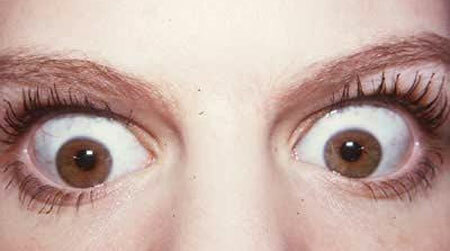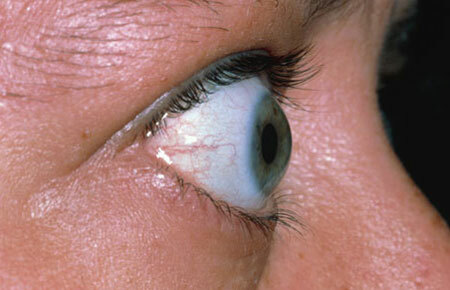In a simple language, thyrotoxicosis can be described as a failure in the thyroid gland, accompanied by a violation of the production of vital hormones, which leads to the development of the disease.
Thyrotoxicosis of the thyroid gland - what is it?
Thyrotoxicosis is a pathological condition of the thyroid gland, in which the body begins to produce hormones in increased amounts, against which the entire body suffers from symptoms of intoxication.

Depending on the disease severity allocate three degrees thyrotoxicosis:
- grade 1( mild form) - pronounced clinical picture is missing, patient refers to a person skilled in the main complaints of failures in the nervous system activity( irritability, insomnia, neurosis, headaches fights);
- 2 degree( medium gravity) - the body weight of the patient is rapidly decreasing, weight loss can reach more than 10 kg per month, except for it dyspnea, heart palpitations;
- 3 degree( severe form) - there is a depletion of the patient, a violation in the work of vital organs, signs of general intoxication.
There is another form of the disease - subclinical hyperthyroidism, in this case the patient has no clinical manifestations of pathology, however, blood tests show an excess of thyroid hormones in the body.
In the absence of timely diagnosis and medical intervention, this form of the disease leads to a violation of the heart rhythm, insomnia, neurosis, blockage of veins with thrombi, tremor of the extremities.
Excessive production of hormones can be caused by many reasons, the most common ones are:
- diffuse hyperthyroidism( Graves' disease or Grave's disease) - in most cases is caused by autoimmune disorders, as a result of which the thymus gland begins to produce antibodies that destroy their same own cells;
- Toxic thyrotoxicosis( or toxic adenoma) - in the thyroid gland formed a node that begins to produce hormones - most often this species occurs in the elderly;
- Diseases of the pituitary gland of benign nature;
- Thyroid trauma, surgical interventions, inflammatory thyroid disease;
- Treatment with iodine-containing drugs;
- Overdose of drugs - synthetic analogues of thyroid hormones.
Content
- 1 Symptoms of hyperthyroidism, the clinical signs
- 1.1 Symptoms of hyperthyroidism in women
- 2 diagnosis of hyperthyroidism
- 3 Treatment of hyperthyroidism, drugs
- 3.1 complications of hyperthyroidism
- 4 thyrotoxicosis and pregnancy
- 5 Prevention of hyperthyroidism
Symptoms of hyperthyroidism, the clinical signs
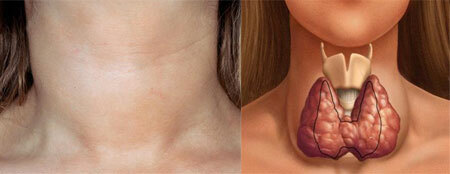
disease causes the disruption of vital organs andsystems, therefore, the clinical signs and symptoms of thyrotoxicosis may be quite different for differentpatients, the main symptomatology:
- From the nervous system - irritability, insomnia, anxiety, headaches, neurosis;
- From the cardiovascular system - heart palpitations, cardiac arrhythmia, increased blood pressure, the development of heart failure;
- From the skin - increased sweating, lower body temperature, hair loss;
- Sensation of foreign body in the throat, difficulty swallowing.
One of the characteristic symptoms of an overdose of thyroid hormones by the body is a glaucoma( protrusion of eyeballs from orbits) and goiter. The patient is afraid of harsh light, experiencing pain, tears flow from the eyes.
On the part of the genitourinary system, the patients have a decrease or a complete absence of sexual attraction, erectile dysfunction in men and menstrual cycle disorders in women.
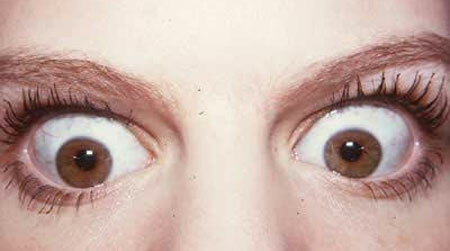
Symptoms of thyrotoxicosis in women

characteristic symptoms, photo
The thyrotoxicosis in women affects the work of the reproductive organs, namely the uterus and the ovaries, resulting in the following symptoms:
- Menstrual irregularities - absence of menstruation for several months, spotting spotting from the vagina inmiddle of the cycle;
- Infertility;
- Decrease or total absence of libido;
- Impossibility to endure pregnancy if conception does occur.
In addition, with an excess of thyroid hormones in the body, women quickly develop osteoporosis, leading to fractures of the bones, even with the most minor injuries.
Diagnosis of thyrotoxicosis
For diagnosis in a patient with thyrotoxicosis, the doctor appoints to take blood tests for thyroid hormones( T3, T4 and TTG).At a significant excess of the indices from the norm, the expert puts the diagnosis - hyperthyroidism, which additionally should be confirmed by other methods of research:
- Analyzes for the detection of antibodies( necessary for the purpose of setting the autoimmune cause of the disease);
- of thyroid ultrasound;
- MRI or CT;
- Consultation of an ophthalmologist and determination of the cause of exophthalmos( pchego-eyes).
Treatment of thyrotoxicosis, preparations
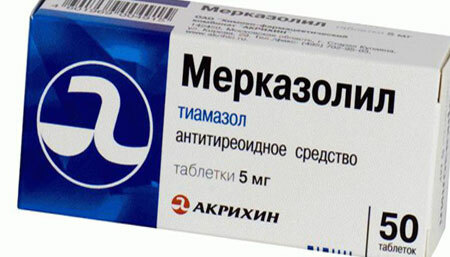
To determine the method of treatment of thyrotoxicosis, first of all, to identify the "source" of the disease. The most common cause of development is the Basedova disease.
At the initial stage of the pathology, medical treatment is effective, namely, the administration of thyreostatics( drugs that reduce the activity of the thyroid gland) to the patient - Mercazolil, Tyrozol, Propitsil. The dose of the drug and the duration of treatment is determined by the doctor individually for each individual patient with thyrotoxicosis. Usually, these drugs should be taken for at least 1 year.
With destructive thyroid tissue disorders, patients are prescribed a course of treatment with glucocorticosteroids - this helps reduce the damaging processes in the gland and somewhat reduce the progression of the disease.
After the course of treatment with thyreostatics, the patient, if necessary, undergoes surgical intervention.
Treatment of thyrotoxicosis with Endonorm is carried out in the case of diagnosing the autoimmune nature of the origin of the disease. This medicine is a biologically active additive, which includes plant and natural components, their action is directed to the restoration of damaged tissues and thyroid cells.
Complications of thyrotoxicosis
A dangerous complication is thyrotoxic crisis - a condition that poses a threat to the life of the patient. Provoke the development of the crisis can be transmitted infectious diseases, surgery, stress, lack of adequate therapy.
Thyrotoxic crisis is accompanied by a number of clinical symptoms:
- Raise body temperature to 40-41 degrees;
- Increase in blood pressure( over 200 mm Hg systolic indicators);
- Tachycardia( more than 180 beats / min);
- Development of acute heart failure;
- Dyspeptic disorders - vomiting, diarrhea, nausea.
If the patient does not provide immediate assistance, death can result as a result of disruption of all vital organs and systems - kidneys, heart, respiratory system.
Thyrotoxicosis and pregnancy
If a woman develops thyrotoxicosis, pregnancy is almost impossible because of numerous violations from the hormonal background and the reproductive system in general. If the conception is still there, then such a patient should register as soon as possible in the women's consultation.
The danger of pathology for expectant mothers and babies is the formation of congenital malformations in the fetus against the background of progression of the disease( in pregnancy, all chronic diseases worsen).
Despite the risks, with timely access to a gynecologist, examination and the appointment of adequate therapy, pregnancy can be saved, and the child is born at the right time healthy.
If a woman is aware of the presence of thyrotoxicosis, then pregnancy should be planned. Planning includes a complete examination, treatment and consultation of the endocrinologist. With the right approach, a woman can bear and give birth to a healthy child.
Prevention of thyrotoxicosis
There are no specific rules for prevention, but if the patient has cases of thyroid disease in the family, then you should carefully consider your health and regularly be screened by an endocrinologist for prevention - examination and palpation of the gland, blood tests for TSH, T3and T4.
Timely detection of the disease helps to avoid many complications.
Persons with hyperthyroidism should adhere to a special diet. A diet with thyrotoxicosis provides for an increased calorie content in dishes to restore the body's energy reserves and prevent depletion.
Foods rich in iodine should be avoided - shrimp, mussels, sea kale, sea fish - this can lead to worsening of the general condition and the progression of the disease.

